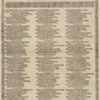The Lamentation of Englande:
Title
The Lamentation of Englande:
Subtitle
For the late Treasons conspired against the Queenes Maiestie and the vvhole Realme, by Franuces Throgmorton: who was executed for the same at Tyborne, on Friday being the tenth day of Iuly last past. 1584.
Synopsis
This piece reports some details of Francis Throckmorton's conspiracy with 'the Queene of Scottes,' and mentions in passing two earlier Catholic conspirators against the life of Elizabeth, John Somerville and Edward Arden, wh owere executed in December of 1583.
Digital Object
Image / Audio Credit
National Library of Scotland - Crawford, Crawford.EB.1361; EBBA 33815
Set to tune of...
Weepe, weepe
Composer of Ballad
W. M.
Crime(s)
high treason
Gender
Date
Execution Location
Tyburn
Printing Location
London, by Richard Ihones
Tune Data
Reference: Weepe, weepe (Simpson 1966, pp. 660-61)
Notes
Wikipedia: Sir Francis Throckmorton (1554 - July 1584) was a conspirator against Queen Elizabeth I of England.
He was the son of Sir John Throckmorton and a nephew of Sir Nicholas Throckmorton, one of Elizabeth's diplomats. Sir John had held the post of Chief Justice of Chester but was removed in 1579, a year before his death. The reasons for Sir John's removal from the bench are unclear; he may have been guilty of abuses in the administration of justice, but he may also have been singled out for punishment for his pro-Catholic beliefs.
Throckmorton was educated in Oxford and entered the Inner Temple in London as a pupil in 1576. In 1580, he traveled to the European continent and met leading Catholic malcontents from England in Spain and France. After his return to England in 1583, he served as an intermediary for communications between supporters of the Catholic cause on the continent, the imprisoned Mary, Queen of Scots, and the Spanish ambassador Bernardino de Mendoza.
Throckmorton's activities raised the suspicions of Sir Francis Walsingham, Elizabeth I's spymaster. A search of his house produced incriminating evidence and, after torture on the rack, Throckmorton confessed his involvement in a plot to overthrow the Queen and restore the Catholic Church in England. An invasion led by Henry I, Duke of Guise would have been coupled with an orchestrated uprising of Catholics within the country.
Although Throckmorton later retracted his confession, he was convicted of high treason and executed in 1584.
He was the son of Sir John Throckmorton and a nephew of Sir Nicholas Throckmorton, one of Elizabeth's diplomats. Sir John had held the post of Chief Justice of Chester but was removed in 1579, a year before his death. The reasons for Sir John's removal from the bench are unclear; he may have been guilty of abuses in the administration of justice, but he may also have been singled out for punishment for his pro-Catholic beliefs.
Throckmorton was educated in Oxford and entered the Inner Temple in London as a pupil in 1576. In 1580, he traveled to the European continent and met leading Catholic malcontents from England in Spain and France. After his return to England in 1583, he served as an intermediary for communications between supporters of the Catholic cause on the continent, the imprisoned Mary, Queen of Scots, and the Spanish ambassador Bernardino de Mendoza.
Throckmorton's activities raised the suspicions of Sir Francis Walsingham, Elizabeth I's spymaster. A search of his house produced incriminating evidence and, after torture on the rack, Throckmorton confessed his involvement in a plot to overthrow the Queen and restore the Catholic Church in England. An invasion led by Henry I, Duke of Guise would have been coupled with an orchestrated uprising of Catholics within the country.
Although Throckmorton later retracted his confession, he was convicted of high treason and executed in 1584.
Collection
Citation
“The Lamentation of Englande:,” Execution Ballads, accessed March 2, 2026, https://omeka.cloud.unimelb.edu.au/execution-ballads/items/show/910.

